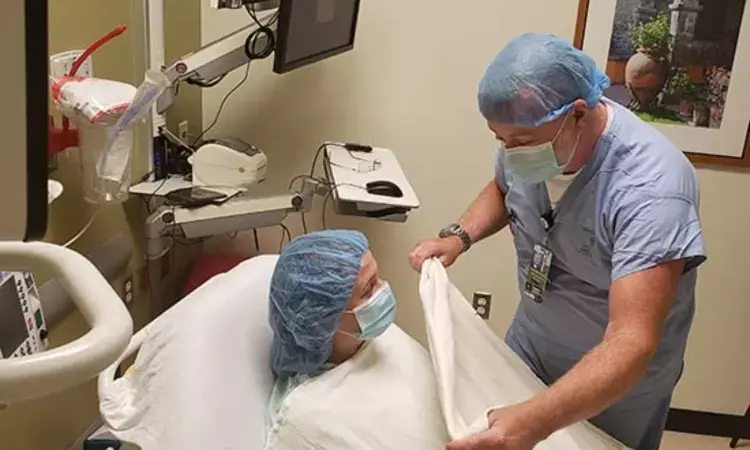- Home
- Medical news & Guidelines
- Anesthesiology
- Cardiology and CTVS
- Critical Care
- Dentistry
- Dermatology
- Diabetes and Endocrinology
- ENT
- Gastroenterology
- Medicine
- Nephrology
- Neurology
- Obstretics-Gynaecology
- Oncology
- Ophthalmology
- Orthopaedics
- Pediatrics-Neonatology
- Psychiatry
- Pulmonology
- Radiology
- Surgery
- Urology
- Laboratory Medicine
- Diet
- Nursing
- Paramedical
- Physiotherapy
- Health news
- Fact Check
- Bone Health Fact Check
- Brain Health Fact Check
- Cancer Related Fact Check
- Child Care Fact Check
- Dental and oral health fact check
- Diabetes and metabolic health fact check
- Diet and Nutrition Fact Check
- Eye and ENT Care Fact Check
- Fitness fact check
- Gut health fact check
- Heart health fact check
- Kidney health fact check
- Medical education fact check
- Men's health fact check
- Respiratory fact check
- Skin and hair care fact check
- Vaccine and Immunization fact check
- Women's health fact check
- AYUSH
- State News
- Andaman and Nicobar Islands
- Andhra Pradesh
- Arunachal Pradesh
- Assam
- Bihar
- Chandigarh
- Chattisgarh
- Dadra and Nagar Haveli
- Daman and Diu
- Delhi
- Goa
- Gujarat
- Haryana
- Himachal Pradesh
- Jammu & Kashmir
- Jharkhand
- Karnataka
- Kerala
- Ladakh
- Lakshadweep
- Madhya Pradesh
- Maharashtra
- Manipur
- Meghalaya
- Mizoram
- Nagaland
- Odisha
- Puducherry
- Punjab
- Rajasthan
- Sikkim
- Tamil Nadu
- Telangana
- Tripura
- Uttar Pradesh
- Uttrakhand
- West Bengal
- Medical Education
- Industry
Keeping It Warm: A Comprehensive Study on Postoperative Hypothermia in Non-Cardiac Surgery

Postoperative hypothermia is a prevalent issue among non-cardiac surgery patients that can have serious consequences but often goes unaddressed. To address this problem, a study was conducted to identify risk factors for postoperative hypothermia in this patient population. Recently published study analyzed various factors contributing to postoperative hypothermia, focusing on age, BMI, ASA classification, type of surgery, blood loss, fluid administration, blood transfusion, anesthesia and surgery duration as potential risk factors.
Risk Factors for Postoperative Hypothermia
The analysis revealed that age over 60 years, BMI less than 18.5 kg/m², ASA III-IV classification, endoscopic surgery, blood loss exceeding 100 ml, intravenous fluid administration over 1000 ml, blood transfusion, anesthesia time longer than 60 minutes, and surgery time exceeding 60 minutes were associated with an increased risk of postoperative hypothermia. Elderly patients are particularly vulnerable due to reduced subcutaneous fat and thermoregulatory function. Patients with high body fat are at a lower risk due to increased metabolic rate, while those with low BMI are more prone to hypothermia.
The study emphasized the importance of proper temperature management for elderly and high-risk patients. It highlighted the impact of longer anesthesia and surgery times on hypothermia risk, suggesting that prolonged exposure to anesthetic drugs and low-temperature environments can lead to heat loss. Endoscopic surgeries were found to increase the risk of hypothermia due to continuous insufflation and irrigation, leading to heat loss. Fluid rehydration exceeding 1000 ml and blood loss over 100 ml were also identified as significant predictors of hypothermia. Despite the comprehensive analysis, the study acknowledged limitations such as potential language bias, incomplete data, and a focus on adult non-cardiac surgery patients. The findings emphasize the need for tailored interventions and proactive measures to prevent postoperative hypothermia in at-risk populations. The quality of evidence for identified risk factors varied from very low to low, with intraoperative blood loss emerging as a key predictor. The study underscores the importance of early identification and management of high-risk individuals to mitigate complications and enhance patient outcomes following non-cardiac surgeries.
Conclusion
In conclusion, this research provides valuable insights into risk factors for postoperative hypothermia in non-cardiac surgery patients, offering a foundation for developing effective management protocols. Recognizing and addressing these risk factors early on can significantly improve patient outcomes and reduce the incidence of postoperative hypothermia in this population.
Key Points
- Age over 60 years, BMI less than 18.5 kg/m², ASA III-IV classification, endoscopic surgery, blood loss exceeding 100 ml, intravenous fluid administration over 1000 ml, blood transfusion, anesthesia time longer than 60 minutes, and surgery time exceeding 60 minutes were identified as risk factors for postoperative hypothermia.
- Elderly patients are more vulnerable to hypothermia due to reduced subcutaneous fat and thermoregulatory function, while patients with high body fat have a lower risk because of an increased metabolic rate.
- Prolonged anesthesia and surgery times contribute to hypothermia risk by exposing patients to heat loss in low-temperature environments.
- Endoscopic surgeries increase the risk of hypothermia through continuous insufflation and irrigation, leading to heat loss. - Factors like fluid rehydration exceeding 1000 ml and blood loss over 100 ml were significant predictors of postoperative hypothermia.
- The study highlights the importance of tailored interventions and proactive measures to prevent postoperative hypothermia in high-risk populations, emphasizing the need for early identification and management of at-risk individuals to enhance patient outcomes following non-cardiac surgeries.
Reference –
Ruyi Tan et al. (2025). Risk Factors For Postoperative Hypothermia In Non-Cardiac Surgery Patients: A Systematic Review And Meta-Analysis. *BMC Anesthesiology*, 25. https://doi.org/10.1186/s12871-025-03089-9.
MBBS, MD (Anaesthesiology), FNB (Cardiac Anaesthesiology)
Dr Monish Raut is a practicing Cardiac Anesthesiologist. He completed his MBBS at Government Medical College, Nagpur, and pursued his MD in Anesthesiology at BJ Medical College, Pune. Further specializing in Cardiac Anesthesiology, Dr Raut earned his FNB in Cardiac Anesthesiology from Sir Ganga Ram Hospital, Delhi.
Dr Kamal Kant Kohli-MBBS, DTCD- a chest specialist with more than 30 years of practice and a flair for writing clinical articles, Dr Kamal Kant Kohli joined Medical Dialogues as a Chief Editor of Medical News. Besides writing articles, as an editor, he proofreads and verifies all the medical content published on Medical Dialogues including those coming from journals, studies,medical conferences,guidelines etc. Email: drkohli@medicaldialogues.in. Contact no. 011-43720751


